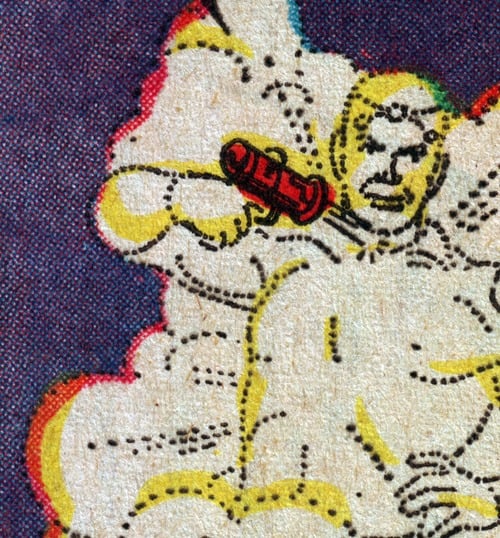BRAINIAC Q&A (11)
By:
October 15, 2012
From late September 2002 through early 2006, HILOBROW’s Joshua Glenn wrote THE EXAMINED LIFE, a weekly three-item column for the Boston Globe’s Ideas section; and from late 2006 though mid-2008, he wrote BRAINIAC, an Ideas section blog that was repurposed as a three-item weekly column in the paper. This series reprints a few Q&As from Glenn’s two Ideas columns. [Brainiac image via 4CP]

May 29, 2005
PLEDGING ALLEGIANCE IN BOSTON
Last year, the U.S. Supreme Court dismissed a suit arguing that the words “under God” in the Pledge of Allegiance violates the Constitution’s mandated separation of church and state. But the quixotic lawsuit did accomplish one thing: Many Americans now realize that those two words were added to the pledge in 1954 by a Congress anxious to broadcast what set the United States apart from the atheistic Soviet Union. In fact, the history of the pledge, which begins in the offices of a Boston-based magazine in 1891, may tell us less about our nation’s highest ideals than it does about our deepest anxieties, as Richard J. Ellis, a professor of politics at Willamette University, argues in his new book, To the Flag (Kansas). Ellis spoke with me via phone from his home in Salem, Ore.
BRAINIAC: How did Francis Bellamy — a minister who resigned from Boston’s Bethany Baptist Church in 1891 because his socialist views alarmed his genteel parishioners — come to write the Pledge?
ELLIS: Daniel Ford, one of the church’s parishioners, was also the publisher of the popular periodical the Youth’s Companion. Although by no means a socialist, Ford sympathized with Bellamy’s view that Americans were too focused on getting rich, rather than serving their country…. Bellamy was put to work helping the magazine promote a one-day event in which the American flag would be flown over every public school in the country. The idea was to combat the atomizing effects of industrial capitalism by encouraging patriotism. Bellamy wrote the pledge as part of a program of events for schools to follow on that particular day. He had no idea it would become an institution.
BRAINIAC: You write that Bellamy was concerned with the pledge’s effect on new immigrants, particularly Catholics and Jews.
ELLIS: Besides wanting to rekindle patriotism among the native-born, Bellamy hoped the pledge would help make the children of these new immigrants loyal Americans. The idea that people could become Americans by pledging allegiance to the flag and to the republic for which it stands is a profoundly liberal one: The markers of citizenship here are not race and ethnicity, but a commitment to certain ideals, to liberty and justice for all. But as his other speeches and writings demonstrate, Bellamy was also a race-conscious nativist, proud of his Anglo-Saxon roots and anxious, like many Bostonian WASPs, that the new immigrants would undermine the American experiment. This fear of immigrants is the dark underbelly of the pledge, and I think the main reason it was written.
BRAINIAC: Why has the Pledge of Allegiance been so prominent since 9/11?
ELLIS: We tend to place the most emphasis on the pledge when we are most anxious about the future of American ideals and institutions. If we were truly confident in the power of American ideals and institutions to win over the hearts of minds of people, we might be more willing to dispense with the peculiar ritual of having schoolchildren declare their allegiance to the nation on a daily basis.
READ MORE essays by Joshua Glenn, originally published in: THE BAFFLER | BOSTON GLOBE IDEAS | BRAINIAC | CABINET | FEED | HERMENAUT | HILOBROW | HILOBROW: GENERATIONS | HILOBROW: RADIUM AGE SCIENCE FICTION | HILOBROW: SHOCKING BLOCKING | THE IDLER | IO9 | N+1 | NEW YORK TIMES BOOK REVIEW | SEMIONAUT | SLATE
